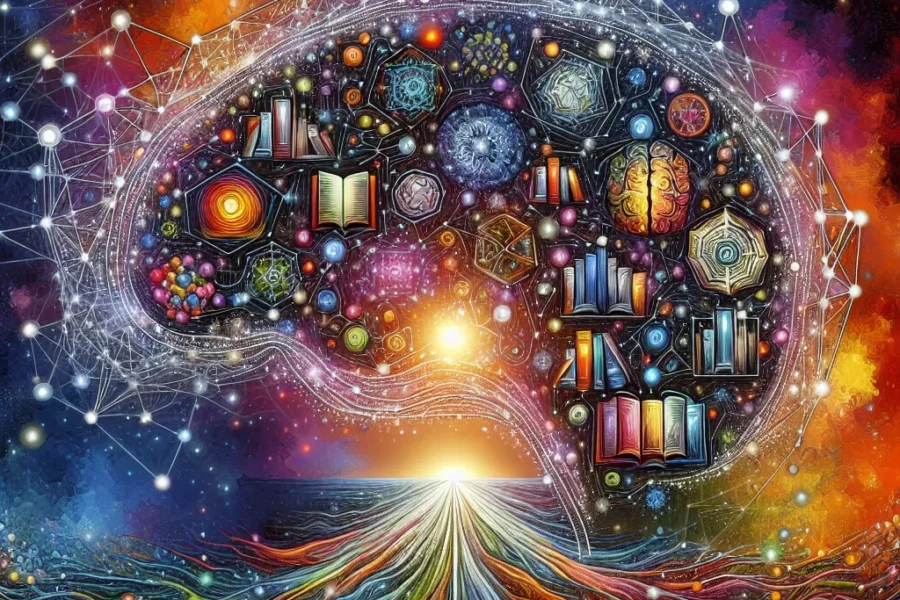Critical thinking has emerged as one of the most crucial skills for success in the 2020s, particularly as we navigate an increasingly complex digital landscape filled with artificial intelligence, social media algorithms, and unprecedented access to information. This fundamental cognitive ability enables us to effectively analyze, evaluate, and reconstruct our thoughts and beliefs in light of evidence and logic. In today’s fast-paced world, where misinformation spreads at lightning speed and deep fakes become increasingly sophisticated, critical thinking serves as our cognitive defense system against manipulation and false narratives.
If you want to know your own IQ, we have a free iq test here.
Modern critical thinking encompasses several interconnected processes that have become even more relevant in our digital age. At its foundation lies the art of questioning – not just accepting information at face value, but developing a healthy skepticism that drives us to dig deeper. Critical thinkers have learned to pause before sharing that viral social media post, to verify sources before accepting claims, and to consider the broader context of any given situation.
The analytical component of critical thinking has evolved with the digital revolution. Today’s critical thinkers must navigate not just traditional sources of information, but also big data, artificial intelligence outputs, and algorithm-curated content. They must be adept at breaking down complex problems into manageable components while understanding how these pieces fit into larger systems and patterns.
Interpretation in the modern context requires an additional layer of sophistication. Critical thinkers must now consider not just the content of information, but also its delivery method, the technology platforms involved, and the potential biases built into the systems that process and present this information. This includes understanding how social media algorithms work, recognizing sponsored content, and identifying potential manipulation through emerging technologies.
The evaluation aspect of critical thinking has become increasingly crucial in our era of information overload. With the rise of AI-generated content and sophisticated disinformation campaigns, the ability to assess credibility and distinguish authentic from artificial has never been more important. Critical thinkers must now develop digital literacy skills alongside traditional analytical capabilities.
Problem-solving in today’s context often requires a hybrid approach, combining human insight with technological tools. Critical thinkers must be able to leverage artificial intelligence and other digital resources while maintaining their ability to think independently and creatively. This includes understanding both the capabilities and limitations of these tools while developing solutions that are both innovative and practical.
The communication aspect of critical thinking has expanded to encompass digital literacy and media awareness. In a world of virtual meetings, remote work, and digital collaboration, the ability to express complex ideas clearly across various platforms and mediums has become essential. Critical thinkers must now be adept at both traditional and digital forms of communication.
In everyday life, critical thinking has become our shield against the rising tide of misinformation and digital manipulation. From evaluating health information during a global pandemic to understanding the implications of emerging technologies, critical thinking helps us make informed decisions in an increasingly complex world.
Recent research in cognitive science and neurology has revealed that critical thinking actually rewires our brains, strengthening neural pathways associated with logical reasoning and decision-making. This neuroplasticity suggests that with proper practice and dedication, anyone can enhance their critical thinking capabilities, regardless of age or background.
Educational institutions and workplaces are increasingly emphasizing critical thinking skills, recognizing them as essential for success in the AI era. The ability to think critically has become a key differentiator in job markets where routine tasks are increasingly automated, leaving humans to focus on complex problem-solving and creative thinking.
Modern strategies for developing critical thinking now include digital tools and online resources. From logic-based mobile apps to interactive online courses, technology offers new ways to strengthen these vital cognitive skills. However, traditional methods like reading diverse sources, engaging in meaningful discussions, and practicing reflexive thinking remain equally important.
In the professional world, critical thinking has become a core competency across industries. As automation and AI transform the workplace, employers increasingly value employees who can think strategically, solve complex problems, and adapt to rapid technological change. This skill set has become particularly valuable in fields like data analysis, strategic planning, and innovation management.
Critical thinking in the digital age requires a delicate balance between embracing technological advancement and maintaining human judgment. It enables us to harness the power of new tools and technologies while remaining mindful of their limitations and potential pitfalls. This balanced approach is essential for navigating the challenges of our rapidly evolving world.
In conclusion, while the fundamental principles of critical thinking remain unchanged, their application has evolved to meet the demands of our digital age. As we face unprecedented challenges and opportunities, the ability to think critically becomes not just an advantage but a necessity for survival and success in the modern world. By cultivating these skills, we better equip ourselves to face the challenges of tomorrow while maintaining our autonomy in an increasingly automated world.




Leave a Comment